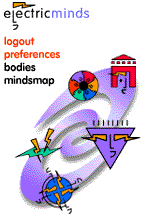
|

|

Would it change politics if any citizen could easily see the stock purchases of our elected officials before and after crucial votes affecting certain industries? Clever use of public information-gathering technology and many-to-many publishing technology is making it possible for citizens to match specific votes and specific stock ownership. Some of the legislators who are so determined to control the Internet might have good cause to fear it., if the Mojo Wire and the Center for Public Integrity are examples of what is to come. Mother Jones magazine first published in its traditional paper edition an article by Professor Gregory Boller and his students at the University of Memphis. "Taking Stock In Congress" used information available on public databases to link the voting records of U.S. Representatives and Senators to their personal stock-trading. This kind of information, legally public but not ordinarily available to citizens who don't know how or where to look for it, reveals some intriguing patterns. When you combine the databases that track the voting and investing information with a network that distributes the information, you create something citizens never had before - a way of keeping track of who owns who in Washington. Mojo Wire, Mother Jones' website, connects the databases into a "Taking Stock in Congress"section where citizens can follow the stock transactions and voting records of "83 members of Congress who purchased or sold stocks near the time of Congressional votes or other government actions relevant to the stocks' value." Boller's team found some "eyebrow-raising coincidences between playing the market and passing the law." Some of the more dramatic discoveries are highlighted by MoJo editors:
"Click on Sen. Alfonse D'Amato (R-NY) and you'll learn how he bought up public utilities stock just two days before President Bush signed the National Energy Conservation Act, which deregulated energy transmissions, offering growth opportunities for many utilities. Was it a coincidence that Rep. Newt Gingrich (R-GA) helped kill amendments to cut funding for the space station program just three weeks after buying stock in Boeing, which was subsequently named the prime contractor for the station? Got milk? Senator Lloyd Bentsen (D-TX) bought stock in food and dairy company Morningstar Foods just four days before the introduction of an amendment to the National School Lunch Act. The amendment called for diversifying milk choices for school lunch programs, opening the door for Morningstar's various milk products. Later that year Bentsen unloaded his Morningstar stock just before the Justice Department opened a probe into the company for bid-rigging." In its section on The Best Congress Money Can Buy, MojoWire provides a set of databases containing data gathered from the Federal Election Commission and the Center for Responsive Politics, enabling citizens to find out which PACs have bought their federal candidates. Another website that provides useful information about funding sources of politcal campaigns is the Center for Public Integrity. CPI founder Charles Lewis was an emmy-nominated investigative reporter for CBS News and ABC News, and is the author of "The Buying of the President" (Avon 1996). Public information makes it possible to track the assets of the top Presidential candidates, including honoraria paid to candidates while holding public office, trips taken, identity of largest contributors. CPI includes list of questions about financial data, directed at Clinton, Dole, and other challengers. CPI reveals information without regard to the political party of the elected official. Here's where the dollars come from, on both sides of the aisle. Use your own judgement and draw your own conclusions about what those contributions mean. Project Vote Smart has candidate and campaign info, voting records, government information, historical documents, even an introduction to "How US Government Works." Doesn't it seem elementary that in a democracy, all citizens ought to know what stocks our representatives own, and whether they were bought or sold before or after crucial votes about the industries our representatives own? The Web makes it extraordinarily easy to automate the gathering, collating, and broadcasting of public information. Is it too dangerous to established authorities for citizens to retain this knowledge power? Is that why the powers that be are trying, and apparently succeeding, at gaining control of these media? In the words of James Madison "A people who mean to govern themselves must arm themselves with the power that knowledge gives." Beware attempts to restrict citizen access to public information about our elected officials. It's equivalent to disarming citizens. |
librarybob said: I think it would be useful to distinguish between "innate ability" and "the result after many years of acculturation and schooling" to define "dumb". I wouldn't think it likely that there has been an innate (genetic) change, so that if people have indeed been dumbed down, it must be due to environmental causes. Actually, maybe "dumbed down" isn't quite right--maybe very committed to "low" and "mid" culture that really doesn't demand much thinking. A problem I see is that both of these are "ahistoric," living in the here and now with little sense of a past and little sense of a future. They lack a larger context. Most Active Topics: Topic 45 The Future of Families Topic 42 Library of Tomorrow: 20 Questions (game) | |||
| ||||
Also in Howard Rheingold's Tomorrow: Collaborative Filtering excerpts from "What Will Be" Digital Maps: | ||||
|
|
|
electric minds |
virtual community center |
world wide jam |
edge tech |
tomorrow |
conversations
Any questions? We have answers.
©1996, 1997 electric minds, all rights reserved worldwide.
|
